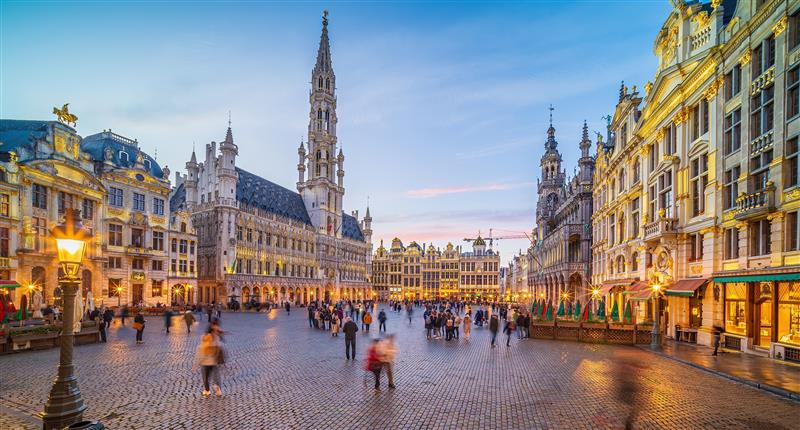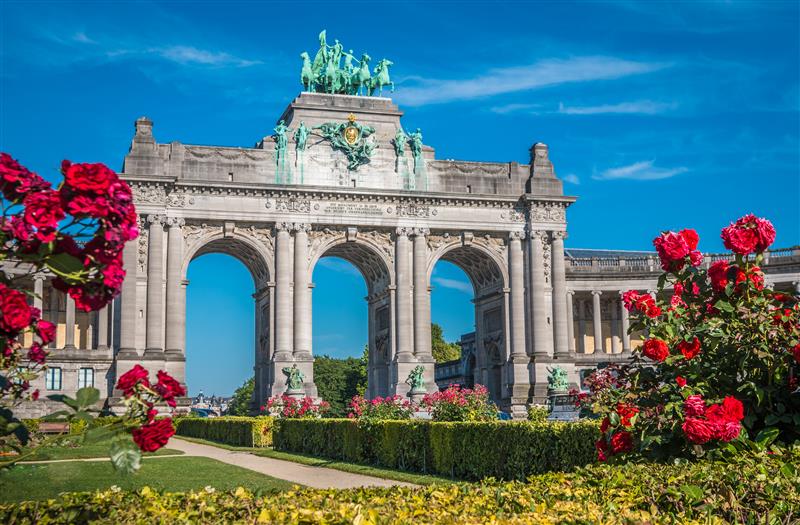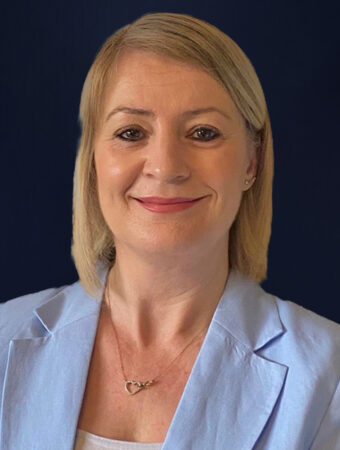Imagine having the freedom to live, work, and thrive anywhere in the world.
At Progeny, many of our colleagues live and work abroad, having relocated to places like Hong Kong, Singapore, Belgium and Dubai. In this series, they share their personal experiences, from the initial planning involved in making the move, to building new communities and adapting to cultural differences. Their stories highlight both the challenges and opportunities of global mobility, and the unique perspective that comes with becoming a true global citizen.
In this interview, we spoke to Amanda Newell, Head of Progeny’s Belgium office.
What is your story before leaving the UK?
I’ve now been living in Belgium for thirteen years, and this year marks a decade with Progeny. I head up our Belgium office, where I also work as a financial advisor. My career has evolved steadily over time – I began in administration, moved into paraplanning and eventually progressed to becoming both an advisor and the head of the Belgium office.
My move to Belgium wasn’t initially about career. I relocated with my ex-partner for his job, bringing along my two young children. Before that, I was living in the UK. I’m originally from Wales, but I left when I was young and settled near Bath in the South-West of England. I ran my own business there in interior design and furnishings and enjoyed twelve years there before taking the leap abroad.
From a young age, I had always dreamed of living overseas, although in my head it was somewhere like Canada or France, never specifically Belgium. When the opportunity came, I saw it as a fresh start, a chance to create a new life for my children and to give them the benefit of growing up with another language and culture. For me, the decision was as much about their future as my own. They adapted quickly to the local school system, and here we are all these years later.
What was your motivation for relocating to Belgium?
I originally came for three years, assuming I would probably return to the UK after that. Many expats in Belgium arrive with that same short-term mindset, but the country has a way of changing your perspective. Some people love it, others struggle – but those who do fall in love with it often stay beyond the initial contract.
After three years, I had a decision to make: return to the UK, where I’d already sold my business and my home, or stay and build on what we had started here. For me, and especially for my children, staying felt like the right choice. Thirteen years later, I know it was.
Did you have short or long-term aspirations to stay?
I would consider relocation to a different part of the world again and I often speak to clients that came with similar aspirations. They were coming for three years or an 18-month contract and 25-30 years later, they’re still here and now asking themselves, do they retire here or somewhere else in Europe?
I don’t have any regrets and I’m unlikely to move back to the UK. You should never say never because you never know what your future circumstances may be however, at present I have no intention to move back.
What were some of your biggest financial and legal considerations before making the move?
Looking back, I realise I was a little naïve when it came to planning. I made decisions with my heart more than my head. I shut down my business, passed my clients on to someone else, and sold my house. Legally, I wanted to make sure I took the right steps and I went through the courts to make sure I could relocate with my children.
My ex-partner’s employer provided some relocation support such as help with schools, property, and banking, but when I became single just 18 months later, I had to start again, finding my own networks and learning to navigate the systems myself. That experience has shaped how I now advise new families moving here. Many tell me they wish there had been someone to guide them through the process. I always recommend taking proper professional advice and speaking to other expats who have been through the process.
How did you settle in initially in terms of finding accommodation, setting up essentials, schooling, healthcare and other systems?
As far fewer people spoke English when I moved, I found this was a challenge at the start. French is widely spoken in Belgium and my French was passable, but when it came to legal and administrative matters, I needed help. For anyone relocating, I’d strongly recommend having someone who can guide you in English as well as the local language, it makes those daunting early steps far smoother.
When it came to the financial aspects of living here, and the day-to-day costs, I feel there has been a shift over the years. When I first arrived, the cost of living was lower than the UK. Now, groceries in Belgium often feel more expensive than back home. It’s hard to say the same for the cost of rent, because obviously if you compare London to Brussels, it’s very similar. Taxes are higher here too, but you see the return in excellent healthcare and education. For example, if I need to see a doctor, get an MRI, or an X-ray, I can be seen within a week – something that’s not always the case in the UK. That makes the higher taxes feel worthwhile.
What were the biggest cultural or lifestyle differences you had to adapt to?
Belgium reminds me very much of the UK in the 70s and 80s. On Sundays everything is closed, you can perhaps find a supermarket that’s open for a couple of hours.
As Belgium has a very family orientated culture, Sundays are for spending time with family. It’s very much like it used to be in the UK, which I think is lovely and I enjoyed the European way of life, that slowing of pace.
I felt that in the UK you were frowned upon for being out doing things like dining at restaurants at certain times of the night with your children. For me, that was a plus and something easy for me to adapt to. And of course, being in the heart of Europe means you can decide on a whim to spend the weekend in France, Germany, or the Netherlands which are all just a short drive away. That accessibility has been one of the real joys of living here.

Did your employer help with the relocation and finding employment, or were you left to manage it all yourself?
I think it depends on the route you take to becoming an expat, if you come into the country via a government route or the EU Parliament or the Commission, you have assistance from the FCO, which is the foreign and Commonwealth Office. It’s not always easy, so I would advise planning ahead and doing your research as it becomes far less daunting the more you know in advance.
How is the professional culture and does this differ from the UK?
It really depends on who you’re working for, those employed by EU institutions often benefit from different tax arrangements, while private-sector employees, like me, are subject to Belgium’s higher tax rates.
Similarly to the UK, you go out with your work colleagues after work to have a drink and socialise. It’s a little bit more relaxed, but the working hours and the amount of work are also similar.
What about the social side?
Networking with other expats was very easy actually, especially in Brussels, because Brussels is mainly made-up of every nationality other than Belgium. There are so many different nationalities here. At my children’s school there are over 140 different nationalities. It’s wonderful for children to grow up in that kind of environment and see different cultures, different ways of thinking. Expats bond quickly; the downside is the transient nature of those friendships; people often move on after a few years. Still, the range of communities, societies, and clubs on offer makes it easy to get involved and build connections.
There are some great countryside walks here including a wide range of idyllic chateaus and castles. There is a plethora of different foods from the many nationalities including mussels, which is what Belgium is famous for and not forgetting the chocolate of course.
Is Belgium a good place to bring up a family?
Belgium has been a fantastic place to raise my children. They were just seven and two when we moved, and neither spoke French. Within months they were fluent. Now, my daughter is at university in Brussels, studying business and languages in both English and French. Watching them grow up in a multilingual, multicultural environment has been one of the greatest rewards.
Childcare here is also remarkably affordable compared to the UK. When I first enrolled both of my children in after-school care, the monthly bill came to just €50 – something I thought must have been a mistake. It’s still very low today. In the UK, childcare had consumed almost 60% of my monthly income, so this difference was life changing.

What advice would you give to someone thinking of relocating like you did?
If I could go back, the only thing I would change is that I’d have done it sooner. It hasn’t always been easy, but it’s been worth it. Every country has its challenges, but Belgium has given my family opportunities I could never have created in the UK.
My advice to anyone considering a similar move is simple: research everything. Ask questions, speak to other expats and take professional advice where you can. Being prepared makes a huge difference. I would recommend it to anybody, if they don’t like it, you can always go back, but if you don’t try, you’ll never know.
Would you consider relocating to a different part of the world again, or is that you settled, maybe thinking about returning to the UK?
Possibly. Like many expats, I’ve spoken to people who came for a short contract and ended up staying for decades. For me, Belgium feels like home now.




